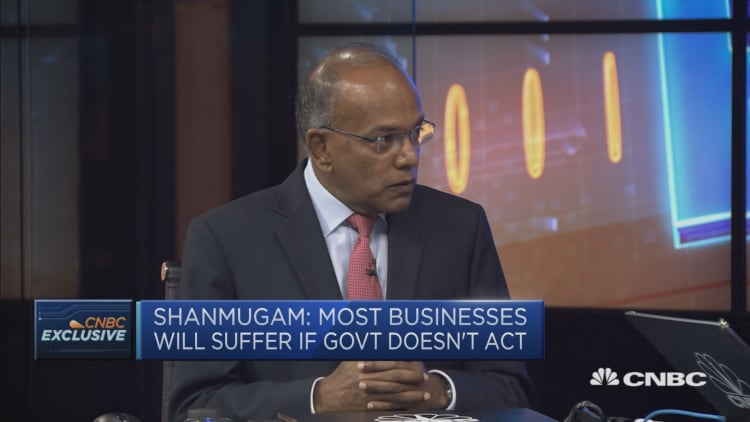
The economic cost and consequences of the coronavirus pandemic are going to be huge and the fight will last for a "very long time," Singapore's minister for home affairs told CNBC.
It is a crisis encompassing several generations and its consequences are likely to be far more serious than past financial crises, according to K. Shanmugam, who is also the law minister.
"We are fighting on the health front, but there's also a huge economic cost. The measures we take, we know that this fight, certainly the economic fight, will be for a very long time," he told CNBC's "Squawk Box" on Wednesday.
"You're looking at economic devastation. Businesses destroyed, people's lives ruined, and in such a situation, you don't talk contract. You talk equity, you talk justice, you talk about what is the right thing to do," he added.
A day earlier, Singapore's parliament passed a new bill that provides temporary relief to businesses and individuals if they are unable to fulfill their contractual obligations due to the coronavirus outbreak such as paying rent. They would be shielded from legal action for six months.
We've got to take whatever steps that are necessary to make sure that the numbers are kept down.K. ShanmugamSingapore Minister for Home Affairs
"The state has every right in such situations, if you look at precedent, to intervene in a temporary way, to give relief, hold the fort, allow people to take stock of their situation," Shanmugam said. He explained the measure would transfer liquidity from landlords to tenants and help distribute the economic pain more evenly.
Still, the law minister explained that the contractual obligations were not abrogated, rather they were temporarily suspended until the situation improved.
"If you insist on your minutest every single contractual right at this point, that will suck the life out of the economy. You have got to protect everyone," Shanmugam added.

Singapore saw a spike in the number of reported cases starting in March when many residents returned from abroad. As of Tuesday noon, the city-state had at least 1,481 cases. Among them, six patients have died and 377 have been cured and discharged.
To tackle the outbreak, Singapore adopted strict social distancing measures that include temporarily shutting all nonessential workplaces and closing schools for a month. People have also been asked to avoid socializing with others beyond their own households. The city-state has also introduced three stimulus packages worth around 12% of Singapore's GDP, or about $41.7 billion, to cushion the economic damage.
The bill that was passed on Tuesday tightened restrictions further, and banned all types of social gatherings in public and private spaces and restricted the movement of people. It also makes a provision for the requisition of land, property or services needed to ramp up Singapore's health care capacity and public health capabilities.
"Members of the public are urged to stay home. There are good and necessary reasons for going out, and these will be allowed by the control order, but we would strongly urge everyone not to go out, except to purchase daily necessities, essential services, or for urgent medical needs," health minister Gan Kim Yong said in parliament.
Shanmugam added that the restrictions would help ensure that Singapore's health-care facilities, its intensive care unit facilities, stay ahead of the projected number of infection cases. "We've got to take whatever steps that are necessary to make sure that the numbers are kept down," he said.
The bill imposes heavy penalties on offenders. People can be fined up to 10,000 Singapore dollars ($7,000) or face six months of imprisonment or both. If they break the rules again, they could be fined up to 20,000 Singapore dollars and face a year of jail time or both.
"When it has the force of law, then people will take it more seriously," Shanmugam said.
Globally, the coronavirus has infected more than 1.4 million people and at least 82,000 have died from the respiratory disease COVID-19 that the virus causes, according to data from Johns Hopkins University.


